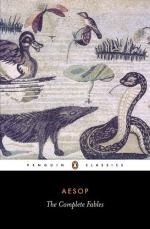Evil wishes, like fowls, come home to roost.
THE OAK AND THE REEDS
An Oak that grew on the bank of a river was uprooted by a severe gale of wind, and thrown across the stream. It fell among some Reeds growing by the water, and said to them, “How is it that you, who are so frail and slender, have managed to weather the storm, whereas I, with all my strength, have been torn up by the roots and hurled into the river?” “You were stubborn,” came the reply, “and fought against the storm, which proved stronger than you: but we bow and yield to every breeze, and thus the gale passed harmlessly over our heads.”
THE BLIND MAN AND THE CUB
There was once a Blind Man who had so fine a sense of touch that, when any animal was put into his hands, he could tell what it was merely by the feel of it. One day the Cub of a Wolf was put into his hands, and he was asked what it was. He felt it for some time, and then said, “Indeed, I am not sure whether it is a Wolf’s Cub or a Fox’s: but this I know—it would never do to trust it in a sheepfold.”
Evil tendencies are early shown.
THE BOY AND THE SNAILS
A Farmer’s Boy went looking for Snails, and, when he had picked up both his hands full, he set about making a fire at which to roast them; for he meant to eat them. When it got well alight and the Snails began to feel the heat, they gradually withdrew more and more into their shells with the hissing noise they always make when they do so. When the Boy heard it, he said, “You abandoned creatures, how can you find heart to whistle when your houses are burning?”
THE APES AND THE TWO TRAVELLERS
Two men were travelling together, one of whom never spoke the truth, whereas the other never told a lie: and they came in the course of their travels to the land of Apes. The King of the Apes, hearing of their arrival, ordered them to be brought before him; and by way of impressing them with his magnificence, he received them sitting on a throne, while the Apes, his subjects, were ranged in long rows on either side of him. When the Travellers came into his presence he asked them what they thought of him as a King. The lying Traveller said, “Sire, every one must see that you are a most noble and mighty monarch.” “And what do you think of my subjects?” continued the King. “They,” said the Traveller, “are in every way worthy of their royal master.” The Ape was so delighted with his answer that he gave him a very handsome present. The other Traveller thought that if his companion was rewarded so splendidly for telling a lie, he himself would certainly receive a still greater reward for telling the truth; so, when the Ape turned to him and said, “And what, sir, is your opinion?” he replied, “I think you are a very fine Ape, and all your subjects are fine Apes too.” The King of the Apes was so enraged at his reply that he ordered him to be taken away and clawed to death.




